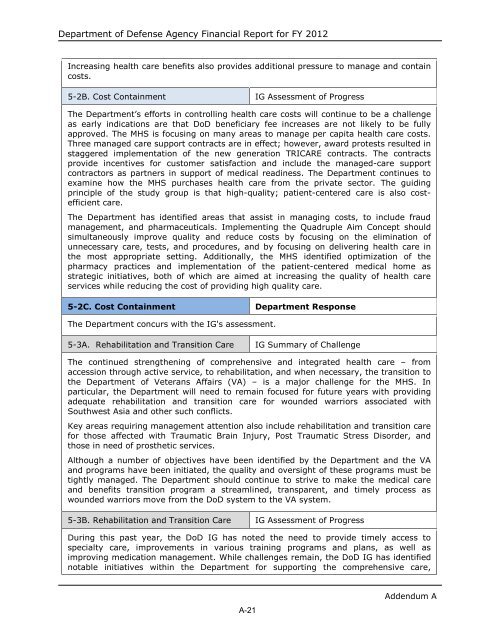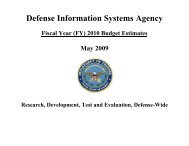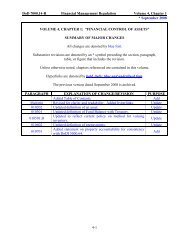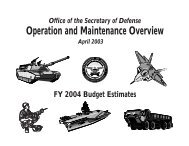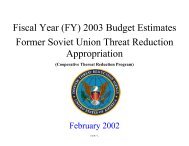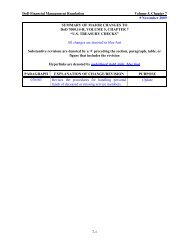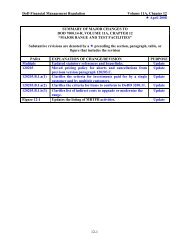department of defense agency financial report fiscal year 2012
department of defense agency financial report fiscal year 2012
department of defense agency financial report fiscal year 2012
Create successful ePaper yourself
Turn your PDF publications into a flip-book with our unique Google optimized e-Paper software.
Department <strong>of</strong> Defense Agency Financial Report for FY <strong>2012</strong><br />
Increasing health care benefits also provides additional pressure to manage and contain<br />
costs.<br />
5-2B. Cost Containment IG Assessment <strong>of</strong> Progress<br />
The Department’s efforts in controlling health care costs will continue to be a challenge<br />
as early indications are that DoD beneficiary fee increases are not likely to be fully<br />
approved. The MHS is focusing on many areas to manage per capita health care costs.<br />
Three managed care support contracts are in effect; however, award protests resulted in<br />
staggered implementation <strong>of</strong> the new generation TRICARE contracts. The contracts<br />
provide incentives for customer satisfaction and include the managed-care support<br />
contractors as partners in support <strong>of</strong> medical readiness. The Department continues to<br />
examine how the MHS purchases health care from the private sector. The guiding<br />
principle <strong>of</strong> the study group is that high-quality; patient-centered care is also costefficient<br />
care.<br />
The Department has identified areas that assist in managing costs, to include fraud<br />
management, and pharmaceuticals. Implementing the Quadruple Aim Concept should<br />
simultaneously improve quality and reduce costs by focusing on the elimination <strong>of</strong><br />
unnecessary care, tests, and procedures, and by focusing on delivering health care in<br />
the most appropriate setting. Additionally, the MHS identified optimization <strong>of</strong> the<br />
pharmacy practices and implementation <strong>of</strong> the patient-centered medical home as<br />
strategic initiatives, both <strong>of</strong> which are aimed at increasing the quality <strong>of</strong> health care<br />
services while reducing the cost <strong>of</strong> providing high quality care.<br />
5-2C. Cost Containment Department Response<br />
The Department concurs with the IG's assessment.<br />
5-3A. Rehabilitation and Transition Care IG Summary <strong>of</strong> Challenge<br />
The continued strengthening <strong>of</strong> comprehensive and integrated health care – from<br />
accession through active service, to rehabilitation, and when necessary, the transition to<br />
the Department <strong>of</strong> Veterans Affairs (VA) – is a major challenge for the MHS. In<br />
particular, the Department will need to remain focused for future <strong>year</strong>s with providing<br />
adequate rehabilitation and transition care for wounded warriors associated with<br />
Southwest Asia and other such conflicts.<br />
Key areas requiring management attention also include rehabilitation and transition care<br />
for those affected with Traumatic Brain Injury, Post Traumatic Stress Disorder, and<br />
those in need <strong>of</strong> prosthetic services.<br />
Although a number <strong>of</strong> objectives have been identified by the Department and the VA<br />
and programs have been initiated, the quality and oversight <strong>of</strong> these programs must be<br />
tightly managed. The Department should continue to strive to make the medical care<br />
and benefits transition program a streamlined, transparent, and timely process as<br />
wounded warriors move from the DoD system to the VA system.<br />
5-3B. Rehabilitation and Transition Care IG Assessment <strong>of</strong> Progress<br />
During this past <strong>year</strong>, the DoD IG has noted the need to provide timely access to<br />
specialty care, improvements in various training programs and plans, as well as<br />
improving medication management. While challenges remain, the DoD IG has identified<br />
notable initiatives within the Department for supporting the comprehensive care,<br />
A-21<br />
Addendum A


